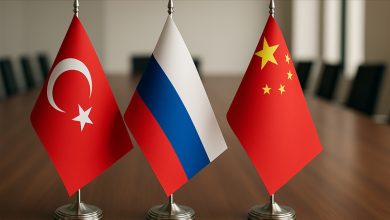
Güney Kore Dışişleri Bakanı Cho Tae-yul, Kuzey Kore’nin askeri alanda genişlemeye öncelik vermesinin “yalnızca ülkenin çöküşünü hızlandıracağını” söyledi.
Yonhap’ın haberine göre, Cho yaptığı açıklamada, Kuzey Kore’den gelecek her türlü provokasyona karşılık vereceklerini ifade ederek, diyalog yoluyla sorunların çözülmesi gerektiğine dikkati çekti.
Kuzey Kore’nin askeri alanda genişlemeye öncelik vermesinin “yalnızca ülkenin çöküşünü hızlandıracağını” dile getiren Cho, Pyongyang yönetiminin ülkeleri bağlayan yolları patlatmasının, birleşme hedefine zarar verdiğini ancak Güney Kore’nin bu hedef için çalışmaya devam edeceğini belirtti.
Rusya ile ilişkilere de değinen Cho, ikili ilişkilerin Moskova hükümetinin atacağı adımlara bağlı olduğunu vurguladı.
Güney Kore, ABD ve Japonya’dan Kuzey Kore’ye kınama
Öte yandan, Güney Kore Dışişleri Bakan Yardımcısı Kim Hong-kyun, başkent Seul’de bir araya geldiği Amerikalı mevkidaşı Kurt Campbell ve Japon mevkidaşı Okano Masataka ile basına açıklama yaptı.
Kim, “iki ülke arasındaki yolların patlatması gibi eylemleriyle gerilimi kasıtlı artırdığı gerekçesiyle Kuzey Kore’yi şiddetle kınadıklarını” ifade ederek, ABD ve Japonya ile üçlü işbirliğini derinleştirme konusunda mevkidaşlarıyla mutabık kaldıklarını aktardı.
Campbell de Kuzey Kore’nin “provokatif adımlarından endişe duyduklarını” belirterek, Kore Yarımadası’nda “barışçıl birleşmeyi” desteklediklerini kaydetti.
Bu yıl ocakta Kuzey Kore lideri Kim Jong-un, Gyeongui kara yolunun kapatılması dahil olmak üzere sınır boyunca iki ülke arasındaki tüm iletişimin kesilmesi için sert önlemler alınması talimatını vermişti.
Güney Kore’den askeri yetkililer nisanda Kuzey Kore’nin, iki Kore’yi birbirine bağlayan ve Askerden Arındırılmış Bölge (DMZ) içerisinde yer alan yollara mayın döşediğini tespit ettiklerini bildirmişti.
Güney Kore Genelkurmay Başkanlığı, 15 Ekim’de, Kuzey Kore’nin, iki ülkeyi birbirine bağlayan yolların bir kısmını patlattığını duyurmuştu.
İki ülke arasında bir süredir “çöp balonu” ve “insansız hava aracı (İHA)” gerilimi tırmanıyor.
Kaynak: AA





